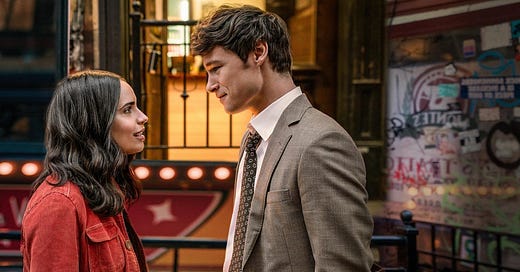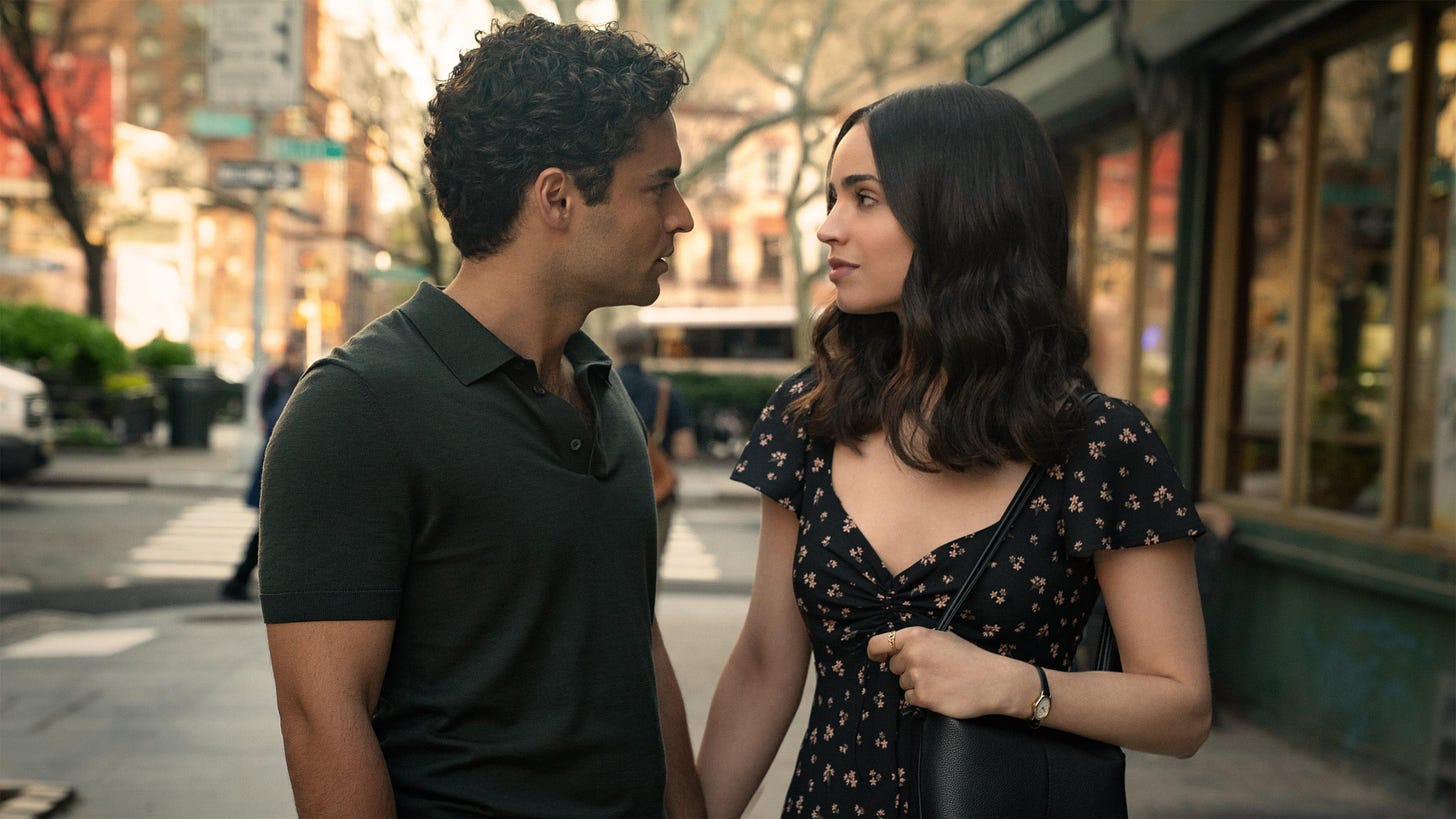Adaptada a partir do livro escrito por Lori Nelson Spielman, A Lista da Minha Vida é a convencional narrativa cômica, dramática e romântica à primeira vista inofensiva. Um passatempo criado com um público alvo feminino específico em mente, que assistirá à trajetória de Alex (Sofia Carson), a filha única e enlutada de Elizabeth (Connie Britton) e que está à procura do caminho de sua vida, aparentemente já encontrado pelos seus dois irmãos bem casados, com filhos e estabelecidos profissionalmente dentro de uma mentalidade de classe média alta suburbana estadunidense. Eu nem teria muito a falar sobre o filme que já não tenha falado antes em obras em que a ‘patinho feio’ da família (re)adquire o amor próprio, dividindo o coração em triângulo amoroso, amadurecendo e, enfim, aprendendo a superar a presença e ausência da figura materna.
Não há muito a ser dito sobre a direção de Adam Brooks, que investe em um xarope de cinema de desenvolvimento pessoal e reprogramação emocional - como uma leitora de meu instagram denominou - e coloca em segundo plano a linguagem cinematográfica, a fim de que não esteja no caminho da história, do conteúdo, da mensagem contida no texto. (Como se a linguagem cinematográfica pudesse estar no caminho, e não reforçar o discurso). É cinema de cartilha: as deixas musicais estão nos momentos adequados, a fim de flexionar os músculos lacrimais dos espectadores; a decupagem é medíocre, em um conjunto de planos e contra planos ou de planos close-up, para reforçar o que quer que Sofia Carson queira demonstrar; mesmo o conceito artístico é rasteiro, com a casa vazia e mal iluminada após a morte da matriarca, em um contraste com a reunião dos irmãos de antes, ou a alternância entre figurinos vivos ou desbotados como expressão da personalidade de Alex.
Eu poderia encerrar a crítica aqui, dar 2 ou 3 estrelas, dependendo da sensibilidade ou da emoção causada, e deixar por isso mesmo, mas A Lista da Minha Vida é, no mínimo, irresponsável, por mascarar detrás de um enlatado convencional e da melhor intenção materna, uma interferência na vida dos filhos mesmo além do túmulo. Aí vale a pena a citação do ponto de partida do roteiro: a morte de Elizabeth, depois de perder (?) a luta contra o câncer, deixando de herança não aquilo que a filha esperava mas um conjunto de DVDs, que somente lhe serão dados à medida que cumprir as missões de uma lista de coisas para fazer que escreveu quando tinha 13 anos. Não tenho dúvida da intenção de Elizabeth, que é comum a todas as mães: ajudar a filha, que navega perdida no mar da vida, a reencontrar o norte. É nobre, mas o meio que elege para fazê-lo, não.
Será que é de bom tom deixar a filha devotada e saudosa refém de uma lista antiga, em uma espécie de gamificação do luto, apenas liberando pílulas de momentos gravados e que podem ser instrumentais para atravessar o momento difícil, quando você acreditar que a filha mereceu? Eu apenas consigo enxergar uma chantagem emocional grosseira e danosa, do tipo, eu digo que te amo se você fizer isso que eu disser para fazer, eu fico contigo se você deixar de ter esse comportamento que eu não gosto que tenha etc. E só para piorar, a pessoa não está materialmente presente para a negociação destes termos - a pessoa é um espectro, persiste somente nas perfurações feitas em um DVD; sequer há como argumentar ou transacionar, só anuir, pois ‘a mãe sabe o que é melhor para a filha’, e os advogados do testamento não podem fazer nada senão cumprir a disposição derradeira de Elizabeth.
A morte torna a conduta ainda mais condenável: Elizabeth não tem o momento típico em que descobre que a sua ação intrometida talvez não fosse o melhor para a sua filha adulta (é importante reforçar isso… Alex não é nenhuma criança ou adolescente). Logo, tampouco o espectador tem essa constatação ou confirmação, por mais artificial que a execução costume acontecer em obras iguais a essa. Não que o espectador não tenha a possibilidade de alcançar a mesma conclusão que acredito ter alcançado nesse texto, é que, ao desprover, a narrativa de um olhar crítico sobre as ações da mãe, Adam Brooks termina por ratificá-la. Quer um exemplo da irresponsabilidade de Elizabeth? Ter sido a responsável, parcialmente pelo menos, do relacionamento conturbado que Alex tem com o pai, Samuel (José Zuniga), ao não ter a coragem de contar a verdade do passado; se o tivesse feito, talvez Alex não vivesse ressentida com a figura paterna que descarta com uma facilidade tremenda, chamando-o de Samuel em vez de pai em um momento capital.
Alex é egoísta e infantilizada, inclusive. A sua insegurança faz com que acredite que o mundo gire em torno das suas dores e frustrações, e apesar de a maioria de nós poder empatizar com isso, o egoísmo dela rapidamente amadurece em mesquinhez típica de quem acredita que aqueles ao redor devem algo à ela. Ela não é tão diferente do ‘alfa’ Garrett (Sebastian de Souza) ou de Finn (Michael Rowland), inteiramente consumido em uma realidade alternativa do videogame e incapaz de perceber um palmo à frente do seu olhar. Não é à toa que a narrativa conduz a afeição da personagem à Brad (Kyle Allen), o bonzinho habitual do gênero e que imediatamente desarma objeções quando rejeita o rótulo de ‘alfa’. Sofia Carson também não ajuda a tornar a personagem mais palatável, ainda que dificuldades ou conquistas de sua vida possam refletir e resvalar nas experiências dos espectadores e criar um momento de cumplicidade, em um filme que não sabe que, de boas intenções, o inferno está cheio.
English review
Emotional irresponsibility disguised as a silly romantic comedy
Adapted from the book written by Lori Nelson Spielman, The Life List is the usual comic, dramatic and romantic narrative that at first glance seems harmless. A pastime created with a specific female target audience in mind, who will watch the journey of Alex (Sofia Carson), the only and grieving daughter of Elizabeth (Connie Britton) who is searching for her life's path, apparently already found by her two happily married brothers, with children and professionally established within an upper middle class American suburban mentality. I wouldn't have much to say about the film that I haven't already said about works in which the 'ugly duckling' of the family (re)acquires self-love, dividing her heart in a love triangle, maturing and, finally, learning to overcome the presence and absence of the maternal figure.
There's also not much to be said about Adam Brooks' direction, which invests in a cinematic syrup of personal development and emotional reprogramming, and puts cinematic language in the background, so that it doesn't get in the way of the story, the content, the message contained within the text. (As if cinematic language could get in the way, and not reinforce the discourse). It's textbook cinema: the musical cues are at the right moments, in order to flex the spectators' tearful muscles; the editing is mediocre, in a set of shots and reverse shots or close-ups, to reinforce whatever Sofia Carson wants to demonstrate; even the artistic concept is shallow, with the empty and poorly lit house after the matriarch's death, in contrast to the reunion of the brothers before, or the alternation between bright or faded costumes as an expression of Alex's personality.
I could end the review here, give it 2 or 3 stars, depending on the sensitivity or emotion it caused, and leave it at that, but The Life List is, at the very least, irresponsible, for masking behind a conventional canned version and the best maternal intentions, an interference in the lives of her children even beyond the grave. Here it is worth mentioning the starting point of the script: Elizabeth's death, after losing (?) the fight against cancer, leaving as an inheritance not what her daughter expected but a set of DVDs, which will only be given to her as she completes the missions on a list of things to do that she wrote when she was 13 years old. I have no doubt about Elizabeth's good intention, which is common to all mothers: to help her daughter, who is lost in the sea of life, to find her way again. It is noble, but the means she chooses to do it is not.
Is it appropriate to leave a devoted and nostalgic daughter hostage to an old list, in a kind of gamification of mourning, only releasing pills of recorded moments that can be instrumental in getting through the difficult moment, when you believe that the daughter deserved it? I can only see a gross and harmful emotional blackmail, like, I say I love you if you do this thing I tell you to do, I'll stay with you if you stop behaving like I don't like you to, etc. And to make matters worse, the person is not physically present to negotiate these terms - the person is a specter, persisting only in the perforations made on a DVD; there is no way to argue or negotiate, only to comply, because 'the mother knows what is best for her daughter', and the lawyers of the will can do nothing but comply with Elizabeth's final disposition.
Death makes the conduct even more reprehensible: Elizabeth does not have the typical moment in which she discovers that her meddling actions may not have been the best for her adult daughter (it is important to emphasize this… Alex is not a child or teenager). Therefore, the viewer does not have this realization or confirmation either, no matter how artificial the execution usually happens in works like this. It is not that the viewer does not have the possibility of reaching the same conclusion that I believe I reached in this text, it is that, by depriving the narrative of a critical look at the mother's actions, Adam Brooks ends up ratifying it. Want an example of Elizabeth's irresponsibility? Having been responsible, at least partially, for the troubled relationship that Alex has with his father, Samuel (José Zuniga), by not having the courage to tell the truth about the past; if she had done so, perhaps Alex would not live resentful towards the father figure that she dismisses with tremendous ease, calling him Samuel instead of father at a crucial moment.
Alex is selfish and childish, even. Her insecurity makes her believe that the world revolves around her pain and frustrations, and while most of us can empathize with that (we’ve been there), her selfishness quickly matures into the pettiness typical of someone who believes that those around her owe her something. She is not so different from the ‘alpha’ male Garrett (Sebastian de Souza) or her ex-boyfriend Finn (Michael Rowland), completely consumed in an alternative reality of the video game and unable to see a hand in front of his eyes. It is no wonder that the narrative leads the character's affection to Brad (Kyle Allen), the usual good guy of the genre who immediately disarms objections when he rejects the label of ‘alpha’. Sofia Carson also does not help to make the character more palatable, even though difficulties or achievements in her life can reflect and slip into the experiences of the viewers and create a moment of complicity, in a film that does not realize that the road to hell is paved with good intentions.








